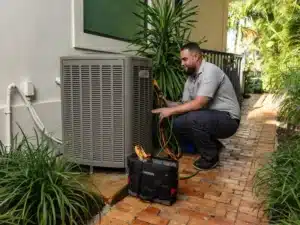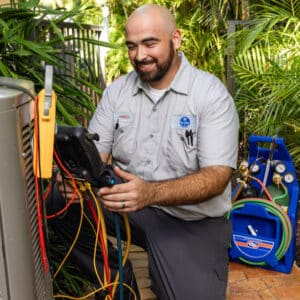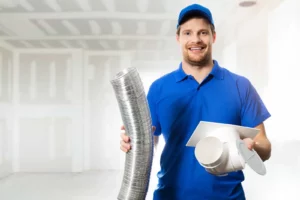What to Expect During a Professional AC Installation
When it comes to keeping your Florida home comfortable, a...
A commercial HVAC system is made up of a sophisticated network of components that aid in controlling the temperature, humidity, and air quality within large buildings. These systems are designed to specifically handle the heating and cooling requirements of commercial buildings such as offices, hospitals, malls, and other industrial structures.
To achieve this, various subsystems come together to regulate the indoor environment based on the weather as well as the needs of the occupants. This includes:
Heating Systems: In cold weather, the indoor atmosphere is heated by the heating system. The system may heat the air using a variety of fuels, including natural gas, electricity, or oil. Boilers, furnaces, and heat pumps are the most typical heating appliances utilized in commercial HVAC systems.
Cooling Systems: In hot weather, the cooling system is in charge of eliminating heat from the indoor environment. To remove heat and discharge it outdoors, the system uses a refrigerant. Chillers, air conditioners, and heat pumps are most frequently utilized in commercial HVAC systems to achieve this.
Ventilation Systems: The ventilation system is in charge of bringing in fresh air and eliminating stale air from the interior space. The system moves air around the structure using fans and ducts. The ventilation system also aids in controlling odors, removing impurities, and regulating humidity levels.
In addition to the heating, cooling, and ventilation systems that make up a commercial HVAC unit, there are several other important components that work to regulate indoor air quality. This includes:
The Thermostat: The HVAC system is controlled by the thermostat. In accordance with the predetermined temperature, the thermostat gauges the inside temperature of the building and signals the HVAC system to switch on or off. Depending on the time of day and the number of occupants, the thermostat can be configured to control the temperature and humidity levels.
The Ductwork: The ductwork, which consists of a network of pipes and ducts, is responsible for distributing air throughout a building. Supply ducts send air into rooms, while return ducts transport air back to the HVAC system for reconditioning. A variety of materials, including metal, fiberglass, and flexible plastic, can be used to create the ductwork.
The Air Handler: The element that moves air throughout the HVAC system is called an air handler. This component has a blower fan that filters out pollutants like dust and pollen as the air is pulled through the return ducts. The evaporator coil, where air is cooled and dehumidified, is then used to condition the air. The conditioned air is subsequently delivered to the occupied spaces via the supply ducts.
The Exhaust System: The exhaust system is in charge of eliminating stale air and bringing in fresh air. It consists of intake fans, which push fresh air into intake vents, and exhaust fans, which push stale air out of the building through exhaust vents. By eliminating any pollutants or impurities, the exhaust system also plays a significant part in preserving the quality of indoor air.
With years of experience in installations, maintenance, and repair, Kyzar Air Conditioning offers expert commercial HVAC services in Palm Beach & Martin County, Florida.
Contact us at 561-640-1000 to find the best solutions to maximize your return on investment.
Disclaimer: All content on this website is intended for informational purposes only. We discourage anyone from attempting to repair, replace, or maintain HVAC systems without the help of a licensed, insured HVAC technician.

When it comes to keeping your Florida home comfortable, a...

Maintaining your air conditioner regularly is more than just a...

Florida homeowners rely on air conditioning more than most parts...

Indoor air quality is a major concern for many Florida...

Indoor air quality, often abbreviated as IAQ, plays a crucial...

Installing a new HVAC system is a significant investment in...